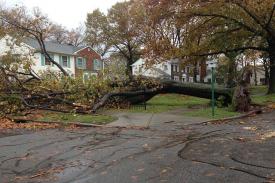
Every year the holiday shopping season opens up on what is known as “Black Friday,” the day after Thanksgiving. A bit like the groundhog on February second that foretells how many weeks are left of winter, the success of Black Friday is said to predict the mood of shoppers and what retailers can expect in sales during that crucial winter rush to buy gifts for Christmas and other seasonal holdidays.
This year analysts and businesses were pleased with Black Friday’s turnout, especially with the sharp rise in online shopping. The stores that did the best, such as Wal-Mart and Macy's, were those that have a strong online presence coordinated in tandem with their physical stores and mobile channels, creating for shoppers a more holistic experience.
"The more you can make a shopper shop multiple channels, they are at least twice as likely to be a loyal shopper and spend tons of money," Patty Edwards, chief investment officer at investment firm Trutina Financial, said.
Observers noticed that although there may be more shopping, individual shoppers were also practicing some restraint in the face of the flood of deals offered during the Black Friday weekend.
According to shoppers’ responses to a Reuters/Ipsos poll, 52 percent of BF shoppers said they stayed within their budgets and 34 percent they actually spent less than what they had planned to spend. Over-budget shoppers totaled only 14 percent of those answering the survey.
Of the 404 respondents to the poll that shopped on BF, 33 percent said that this year’s deals were better than last year’s; 39 percent said the deals they found were the same, and only 15 percent said that this year’s deals were worse.
Analysts are cautioning that just because sales this year appear to be off to a good start it might be premature to judge the rest of the shopping season by figures from just one weekend. The good start will have to be maintained throughout the rest of the shopping season in order for it to have the impact on the entire year: holiday season shopping can account for as much as one-third of annual sales and 40 to 50 percent of annual profits.
Holiday shopping also has a huge impact on the economy as a whole, since consumer spending accounts for approximately 70 percent of all economic activity. There has been a slow but steady improvement in employment statistics, but fears of the approaching “fiscal cliff” that is threatening the entire economy is keeping analysts alert to retail sales and buying patterns of consumers.


